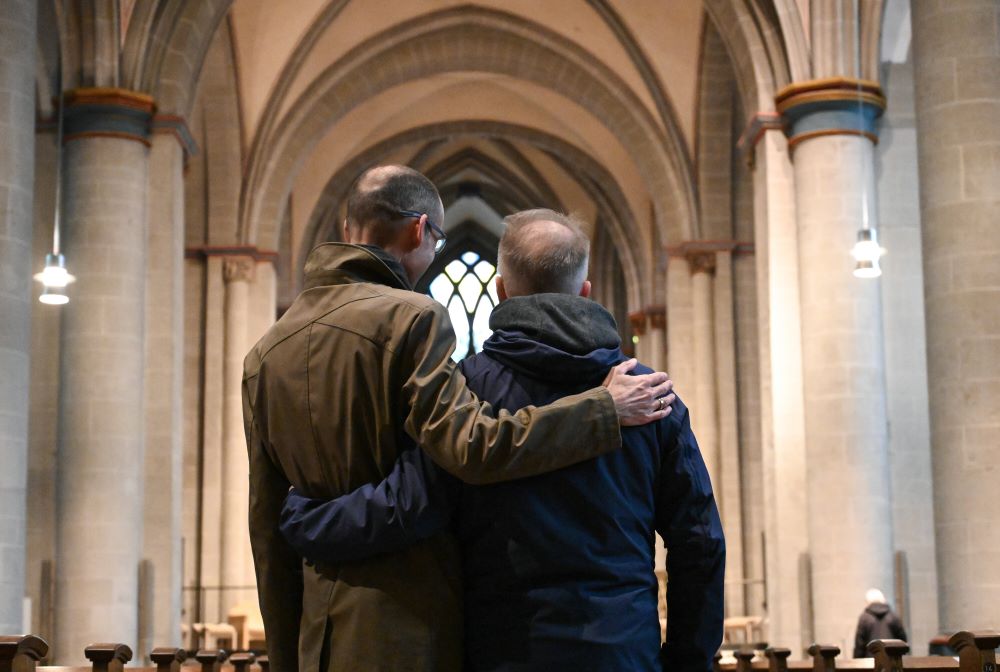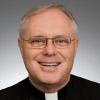Fr. Peter Daly blesses a young couple on the Camino in Spain in 2016. (Courtesy of Peter Daly)
Fiducia Supplicans, the recent Vatican document on blessings, especially blessings for couples in irregular unions and same-sex relationships, would have been a significant help to me a dozen years ago. In the last days of Benedict XVI's papacy, in 2012, I was called to the hospital to anoint a dying man. His mother had called the parish office.
When I approached the hospital room door, a man, probably in his 60s, stood in the doorway. He told me that he was the partner of the dying man. That they had been partners for more than 25 years. He was clearly agitated and challenged me: "What are you going to say to him in there? Are you going to tell him that he is a sinner and that he must repent our relationship?"
I was taken aback. I told him that I would only administer "last rites" of the church, anointing, confession and the Eucharist (if possible). I assured him that I would never tell anyone that he was a sinner. Last rites are meant to offer mercy and a blessing, not to scold or lecture.
But the man was not satisfied. He did not trust me. As a gay man raised in the Catholic Church, he had many years of experience with the harsh and unforgiving "mercy" of the church. He would not permit me to enter the hospital room. I deferred to the partner's wishes and went down the hall to the waiting area to pray privately for the dying man. The partner was protecting his friend from the Catholic Church, which he did not see as a sign of God's love in their lives.
Fiducia Supplicans will help in pastoral situations like my hospital encounter. Pastors can now point to the language of the document to persuade some same-sex couples that they are not outside the circle of God's love or the concern of the church.
The church should not stand in the way of the Holy Spirit.
Nearly four decades after my ordination, I am coming to realize that the most important thing that the church has to give to the world is an experience of God's grace and mercy. This is most often experienced as a "blessing." Anyone who is sincerely looking for God and seeking spiritual help is looking for a blessing. No one who asks for a blessing is morally perfect. Indeed, as we know after all the clergy scandals of the last 30 years, no one who offers a blessing is morally perfect. We are all sinners in need of healing and God's grace — the one who blesses and the one who is blessed.
When I look back on my life as a Catholic priest, I regret the times when I was more concerned about enforcing rules than about imparting grace. But I learned. Pastoral life has a way of bringing you into contact with the complexity of the human condition.
Some examples?
Several times I have refused to officiate at weddings that were not taking place in a Catholic church building, but rather out in a field or on a boat or at a hotel or a country club. Once I refused to do a wedding for a couple on the front lawn of the bride's grandparents, overlooking Chesapeake Bay. It was a lovely spot that had sentimental significance to the bride. But it was not in a Catholic church building. While technically I was following diocesan regulations, I drove the couple away from the church.
Ironically, permission is now freely given to celebrate such weddings. God is everywhere, even on front lawns. Better that the church be present, too. Since my retirement I have participated in several weddings, not in church facilities. They were just as devout and religious as the ones I have celebrated in parish churches.

A couple is pictured inside the Essen Cathedral in Germany on Oct. 30, 2021. (OSV News/KNA/Harald Oppitz)
Once I denied Communion to someone I knew well, on the day I was ordained a deacon at St. Peter's basilica in Rome. The would-be communicant was a friend from law school who was in Rome for my ordination. He was not a Catholic. The "rules" forbid giving Communion to non-Catholics, although I doubt there is no papal mass at St. Peter's Basilica that does not give Communion to a few dozen non-Catholics. My refusal opened a wound in our relationship that has never healed. I learned that the Communion line is not the place to judge worthiness. I never denied anyone Communion again.
It is in that spirit of wanting to impart grace and avoid spiritual harm, that I understand Fiducia Supplicans. Its English title is "On the Pastoral Meaning of Blessings."
Fiducia Supplicans expands on a 2021 statement, which said that the church "cannot bless sin," now offering "a vision that draws together the doctrinal aspects with the pastoral ones."
It specifically says that the blessing of couples in "irregular situations" such as those in same-sex relationships, does not validate their status or change the church's teaching on marriage. But it does offer blessing and grace.
There are many such "irregular unions." Unmarried couples living together. Divorced and remarried couples. Same-sex couples seeking baptism and other sacraments for their children.
The document says that God has communicated to his church the power to bless. Blessings are a form of "comfort, care, and encouragement. The blessing expresses God's merciful embrace and the Church's motherhood."
The act of blessing imparts grace. It is an act of evangelization, which is telling the people blessed "good news." God loves you too. As Supplicans says, when a person comes forward for a blessing, the church should open the door to grace, not exhaust "his or her energies in inspecting and verifying" that a person is already in a state of grace.
Every priest in pastoral life offers blessings to people even when we don't fully know or approve of everything in their lives. I have offered many such blessings.
I have blessed soldiers going off to war, even though I did not approve of the morality of the war. My concern was for the soldiers' safety.
I have asked blessings on government officials as they take office or began a legislative session, even though I knew I would not approve of everything they would do.
I have blessed interreligious gatherings including non-Christians, even though I clearly did not agree with every point of their theology or practice.
Advertisement
Once on the Camino in Spain in 2016, I blessed a young couple, a man and a woman who had been traveling together, as we came to the end of our pilgrimage. They were not married. I did not ask them if they were having sex, though they might have been. I just called down a blessing on them at a pivotal moment in their spiritual journey.
Fiducia Supplicans break no new ground dogmatically. It only reminds pastors of the church that we are meant to show God's love to those seeking a blessing, not our judgment. "The request for a blessing, thus, expresses and nurtures openness to transcendence, mercy, and closeness to God," it says. Those who seek a blessing beg "that all that is true, good, and humanly valid in their lives and relationship be enriched, healed, and elevated by the presence of the Holy Spirit."
As the last paragraph of the document says, we are "always pilgrims, always beggars, always loved, and, despite everything, always blessed."
The church should not stand in the way of the Holy Spirit.







